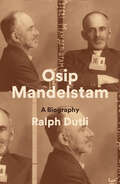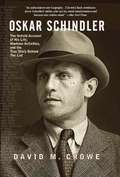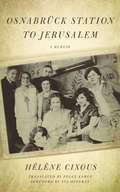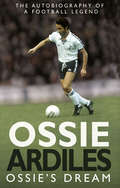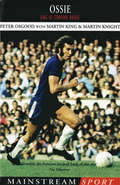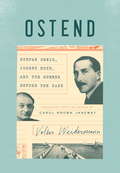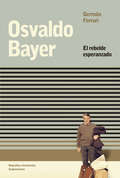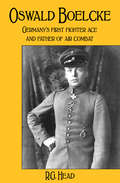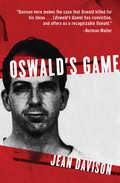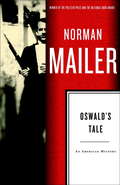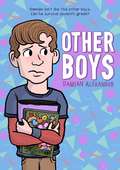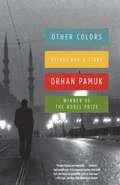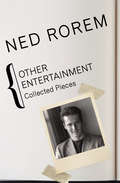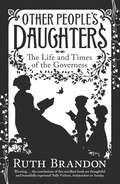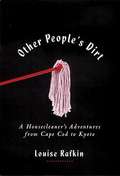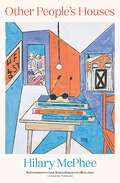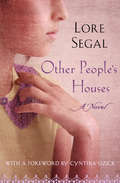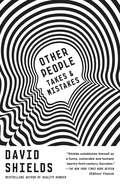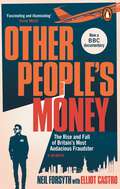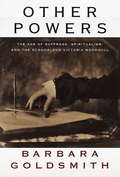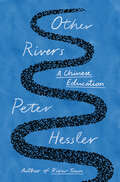- Table View
- List View
Osip Mandelstam: A Biography
by Ralph DutliThe personal and political life of the iconic Russian poet Osip Mandelstam is graphically portrayed in this lavishly illustrated bookThis is the first full-scale biography of Osip Mandelstam to combine an analysis of his poetry with a description of his personal life, from his beginnings as a young intellectual in pre-revolutionary Russia to his final fate as a victim of Stalinism.The myth has grown up that Mandelstam was a gloomy, miserable figure; Dutli deconstructs this, stressing Mandelstam's enjoyment of life. There are several underlying themes here. One is Mandelstam's Jewish background in pre-1914 Russia, which he rejected as a young man, but reaffirmed in later life. Another is the inescapable impact of Russia's political and social transformation.His evolution as a poet naturally occupies a large place in the biography, which quotes many of his most famous poems, including his devastating anti-Stalin epigram. He produced wonderful poetry before the October Revolution, but did not reach his full poetic stature until the 1930s when in exile in Voronezh. He was never an official Soviet poet, and it was only thanks to the intervention of Bukharin that he was brought back from utter impoverishment.The biography gives full weight to his emotional life, beginning with his friendship with two other Russian poets, Marina Tsvetaeva and Anna Akhmatova, followed by love and marriage to Nadezhda Khazina.
Oskar Schindler: The Untold Account of His Life, Wartime Activities, and the True Story Behind the List
by David M. CroweSpy, businessman, bon vivant, Nazi Party member, Righteous Gentile. This was Oskar Schindler, the controversial savior of almost 12,000 Jews during the Holocaust who struggled afterwards to rebuild his life and gain international recognition for his wartime deeds. Author David Crowe examines every phase of the subject's life in this landmark biography, presenting a figure of mythic proportions that one prominent Schindler Jew described as "an extraordinary man in extraordinary times. "
Osnabrück Station to Jerusalem: A Memoir
by Hélène CixousAn inventive literary account of Cixous’s remarkable journey to her mother’s birthplaceWinner, French Voices Award for Excellence in Publication and TranslationFor about eighty years, the Jonas family of Osnabrück were part of a small but vibrant Jewish community in this mid-size city of Lower Saxony. After the war, Osnabrück counted not a single Jew. Most had been deported and murdered in the camps, others emigrated if they could and if they managed to overcome their own inertia. It is this inertia and failure to escape that Hélène Cixous seeks to account for in Osnabrück Station to Jerusalem.Vicious anti-Semitism hounded all of Osnabrück’s Jews long before the Nazis’ rise to power in 1933. So why did people wait to leave when the threat was so patent, so in-their-face? Drawn from the stories told to Cixous by her mother, Ève, and grandmother, Rosalie (Rosi), this literary work reimagines fragments of Ève’s and Rosi’s stories, including the death of Ève’s uncle, Onkel André. Piecing together the story of Andreas Jonas from what she was told and from what she envisages, Cixous recounts the tragedy of the one she calls the King Lear of Osnabrück, who followed his daughter to Jerusalem only to be sent away by her and to return to Osnabrück in time to be deported to a death camp.Cixous wanders the streets of the city she had heard about all her life in her mother’s and grandmother’s stories, digs into its archives, meets city officials, all the while wondering if she should have come. These hesitations and reflections in the present, often voiced in dialogues staged with her own son or daughter, are woven with scenes from her childhood in Algeria and the half-remembered, half-invented stories of the Jonas family, making Osnabrück Station to Jerusalem one of the author’s most intensely engaging books.This work received the French Voices Award for excellence in publication and translation. French Voices is a program created and funded by the French Embassy in the United States and FACE (French American Cultural Exchange).
Ossie's Dream: My Autobiography
by Ossie ArdilesOssie Ardiles is one of the most iconic footballers ever to have graced the game. After winning the World Cup with Argentina in 1978, Ossie became the first foreign player to make an impact in England, paving the way for the modern era of multinational teams. and was immortalised in Chas & Dave's hit record "Ossie's Dream (Spurs Are On Their Way to Wembley)".In that unforgettable 1981 FA Cup Final, the silky skills of Ossie and fellow Argentine midfielder Ricky Villa inspired Spurs to their famous victory over Man City. He also helped Spurs to retain the trophy the following year, and to win the UEFA Cup in 1984, and even found time to star in the classic football film Escape to Victory with Bobby Moore, Pelé, Michael Caine and Sylvester Stallone.Thirty years on from those glory days, Ossie has a unique perspective on the football world, through his long career both playing and in management, with the emphasis always on style and entertainment. He also talks about growing up under a military dictatorship, how he was torn between two countries owing to the outbreak of the Falklands War, which claimed the life of one of his cousins, and how that football world has changed over the decades.
Ossie: King of Stamford Bridge
by Martin Knight Martin King Peter OsgoodIn a 16-year career spent with Chelsea and Southampton, goal-scoring legend Peter Osgood made 560 appearances, scoring 220 goals and winning two FA Cup-winner's medals. He was part of the victorious Chelsea side that defeated the mighty Real Madrid in the 1971 European Cup-Winners Cup final and is the last player to have scored in every round of the FA Cup, including the final.Ossie tells the story of the career and the extraordinary roller-coaster personal life of the man who spearheaded a team that made as many headlines off the field as on. The truth about the hard-drinking and hard-living antics of these Kings Road dandies - Hudson, Cooke, Baldwin and company - has never before been told. Osgood tells of his strained relationship with manager Dave Sexton, which resulted in his and other stars' departures, triggering a decline in Chelsea FC's fortunes that took some 20 years to reverse. He recounts his experience in the Mexico World Cup of 1970 and is brutally honest about the challenges and problems faced by ex-footballers as they attempt to adjust to life in mainstream society. Peter Osgood was no ordinary footballer and Ossie is no ordinary football autobiography. Like the King of Stamford Bridge himself was, this book is entertaining, outspoken and full of surprises.
Ostend
by Carol Janeway Volker WeidermannIt's the summer of 1936, and the writer Stefan Zweig is in crisis. His German publisher no longer wants him, his marriage is collapsing, and his house in Austria--searched by the police two years earlier--no longer feels like home. He's been dreaming of Ostend, the Belgian beach town that is a paradise of promenades, parasols, and old friends. So he journeys there with his lover, Lotte Altmann, and reunites with fellow writer and semi-estranged close friend Joseph Roth, who is himself about to fall in love. For a moment, they create a fragile haven. But as Europe begins to crumble around them, the writers find themselves trapped on vacation, in exile, watching the world burn. In Ostend, Volker Weidermann lyrically recounts "the summer before the dark," when a coterie of artists, intellectuals, drunks, revolutionaries, and madmen found themselves in limbo while Europe teetered on the edge of fascism and total war. Ostend is the true story of two of the twentieth century's great writers, written with a novelist's eye for pacing, chronology, and language--a dazzling work of historical nonfiction. (Translated from the German by Carol Brown Janeway)From the Hardcover edition.
Osvaldo Bayer: El rebelde esperanzado
by Germán FerrariTrayectoria pública y vida privada de uno de los intelectuales argentinos más influyentes, respetados y apreciados, referente ineludible de los derechos humanos que enlaza diferentes generaciones. Osvaldo Bayer compone junto con Rodolfo Walsh y Rogelio García Lupo el trío legendario de periodistas que se formaron bajo el primer peronismo y las dictaduras posteriores. Pasó de las redacciones de los diarios de mayor tirada e influencia al sindicalismo confrontativo al lado de los comunistas y descolló como ensayista e historiador de los conflictos sociales cuyos alcances transformaron la historia del país. La Patagonia rebelde, su obra magna, fue llevada al cine en tiempos de desapariciones primerizas, pero antes ya había asombrado con su investigación sobre Severino Di Giovanni. Este trabajo reforzó su apego al anarquismo, aunque mantuvo un carácter más libertario que el de otras varias corrientes ideologizadas. Osvaldo, compadre inseparable de su tocayo Soriano y siempre embanderado de las causas fundamentales, enlazó su obra intelectual a la participación activa en favor de los derechos humanos y las reivindicaciones de los pueblos originarios. El periodista Germán Ferrari ha indagado como nadie antes en el pasado de Bayer y escrito un retrato fiel de este gran rebelde esperanzado. Isidoro Gilbert
Oswald Boelcke: Germany's First Fighter Ace and Father of Air Combat
by R.G. HeadThis biography of the pioneering WWI flying ace who mentored the Red Baron is &“fascinating . . . [it] captures combat aviation at its inception&” (MiG Sweep: The Magazine of Aviation Warriors). With a total of forty victories, Oswald Boelcke was Germany&’s first ace in World War I—and a century later he remains a towering figure in the history of air warfare, renowned for his character, inspirational leadership, organizational genius, development of air-to-air tactics, and impact on aerial doctrine. Paving the way for modern air forces across the world with his pioneering strategies, Boelcke had a dramatic effect on his contemporaries. The famed Red Baron&’s mentor, instructor, squadron commander, and friend, he exerted a tremendous influence upon the German air force. He was one of the first pilots to be awarded the famous Pour le Mérite, commonly recognized as the &“Blue Max.&” All of this was achieved after overcoming medical obstacles in childhood and later life with willpower and determination. Boelcke even gained the admiration of his enemies: After his tragic death in a midair collision, Britain&’s Royal Flying Corps dropped a wreath on his funeral, and several of his captured foes sent another wreath from their German prison camp. His name and legacy live on, as seen in the Luftwaffe&’s designation of the Tactical Air Force Wing 31 &“Boelcke.&” This definitive biography reveals his importance as a fighter pilot who set the standard in military aviation.
Oswald Chambers: Abandoned to God
by David MccaslandIn Oswald ChambersAbandoned to God, you trace the life of this servant of God from his boyhood home in Scotland through an astounding journey of faith and trust in God's provision. From the United Kingdom, the United States, Japan, and ultimately to a YMCA training camp in Egypt during World War I, you'll find Chambers to be a man utterly devoted to God, His Word, and to sharing the timeless wisdom of the Bible with others. The last six years of his life were spent as principal of the Bible Training College in London and as chaplain to British Commonwealth troops in Egypt during World War I. After Chambers died, at age 43 in 1917, the books that bear his name were compiled by his wife from her own verbatim shorthand notes of his talks. Chambers never lived to see the book for which he is best known, My Utmost for His Highest, published. He left a spiritual legacy that has touched men, women, politicians, and preachers ever since. Now you can read about this remarkable life well-lived and find inspiration to persevere for the sake of Christ.
Oswald's Game
by Jean DavisonWhile much was written in the wake of Lee Harvey Oswald&’s assassination of President John F. Kennedy, few journalists stopped to ask who Oswald really was, and what was driving him. In Oswald&’s Game, Davison slices to the core of the man, revealing Oswald&’s most formative moments, beginning with his days as a difficult but intelligent child. She traces his erratic service in the Marine Corps, his youthful marriage, and the radical interests that prompted him to defect to the Soviet Union. A rounded and enthralling portrait emerges, illuminating Oswald&’s intense conflicts and contradictions. Writing against the grain of earlier accounts, Davison sifts through the evidence to compose an utterly persuasive narrative of Oswald&’s personal and political motivations, based not on conspiracy but on the life of a profoundly troubled man.
Oswald's Tale
by Norman MailerIn perhaps his most important literary feat, Norman Mailer fashions an unprecedented portrait of one of the great villains--and enigmas--in United States history. Here is Lee Harvey Oswald--his family background, troubled marriage, controversial journey to Russia, and return to an "America [waiting] for him like an angry relative whose eyes glare in the heat." Based on KGB and FBI transcripts, government reports, letters and diaries, and Mailer's own international research, this is an epic account of a man whose cunning, duplicity, and self-invention were both at home in and at odds with the country he forever altered.
Ota Benga: The Pygmy in the Zoo
by Phillips Verner Bradford Harvey BlumeIn 1904 Samuel Phillips Verner, an anthropologist and African explorer, brought a young Pygmy man named Ota Benga from the jungles of the Belgian Congo to the United States. Ota Benga joined a group of indigenous people from around the world in an anthropological exhibit at the St. Louis World's Fair. After the fair he remained in the U.S., and, for more than a week in 1906, was displayed in the primate house at the Bronx Zoo. The upheavals around this exhibition are core to this book, but it encompasses far more. Through the story of Ota Benga the authors examine European colonialism, race relations in the U.S. in the early 20th century, and the concept of the "white man's burden." They create a powerful and moving picture of Ota Benga, a man raised to live by hunting and gathering, who died in 1916 in Lynchburg, Virginia after attempting to step from one world to another.
Other Boys
by Damian AlexanderIn Other Boys, debut author Damian Alexander delivers a moving middle grade graphic memoir about his struggles with bullying, the death of his mother, and coming out.Damian is the new kid at school, and he has a foolproof plan to avoid the bullying that's plagued him his whole childhood: he's going to stop talking. Starting on the first day seventh grade, he won't utter a word. If he keeps his mouth shut, the bullies will have nothing to tease him about—right?But Damian's vow of silence doesn't work—his classmates can tell there's something different about him. His family doesn't look like the kind on TV: his mother is dead, his father is gone, and he's being raised by his grandparents in a low-income household. And Damian does things that boys aren't supposed do, like play with Barbies instead of GI Joe. Kids have teased him about this his whole life, especially other boys. But if boys can be so cruel, why does Damian have a crush on one?
Other Colors: Essays and a Story
by Orhan Pamuk Maureen FreelyThis is a collection of essays about the author and his life in Turkey. Pamuk won the Nobel Prize for Literature in 2006.
Other Days
by John HainesSELECTIONS FROM A WORK IN PROGRESS: ESSAYS BY John Haines ILLUSTRATIONS BY Jo HAINES
Other Entertainment: Collected Pieces
by Ned RoremA collection of insightful essays, interviews, and commentaries on music, art, and those who make it, from acclaimed author and Pulitzer Prize–winning composer Ned RoremIt is a rare artist who can deftly cross the boundaries separating one artistic endeavor from another. Contemporary American composer Ned Rorem is one of the able few, not only &“the world&’s best composer of art songs&” (Time magazine) but a remarkable purveyor of prose works, as well. Rorem&’s superb collection Other Entertainment features insightful and fascinating essays on music, musicians, and literature, as well as provocative interviews with well-known figures in the arts and elsewhere. Whether he&’s offering a cogent analysis of Benjamin Britten&’s published diaries, confronting John Simon on the famously acerbic film and theater reviewer&’s alleged homophobia, or providing in-depth commentary on the lives and accomplishments of major artists and musical colleagues—as well as moving obituaries for those we have lost—Rorem proves himself to be as entertaining and controversial a social and cultural critic as America has ever produced.
Other People's Daughters: The Life And Times Of The Governess
by Ruth BrandonA rich and fascinating account of the lives of Victorian governesses, exploring nineteenth-century attitudes to women, family and class.If a nineteenth century lady had neither a husband to support her nor money of her own, almost her only recourse was to live in someone else's household and educate their children - in particular, their daughters. Marooned within the confines of other people's lives, neither servants nor family members, governesses occupied an uncomfortable social limbo. And being poor and insignificant, their papers were mostly lost. But a few journals and letters have come down to us, giving a vivid record of what it was to be a lone professional woman at a time when such a creature officially did not exist.
Other People's Daughters: The Life And Times Of The Governess
by Ruth BrandonA rich and fascinating account of the lives of Victorian governesses, exploring nineteenth-century attitudes to women, family and class.If a nineteenth century lady had neither a husband to support her nor money of her own, almost her only recourse was to live in someone else's household and educate their children - in particular, their daughters. Marooned within the confines of other people's lives, neither servants nor family members, governesses occupied an uncomfortable social limbo. And being poor and insignificant, their papers were mostly lost. But a few journals and letters have come down to us, giving a vivid record of what it was to be a lone professional woman at a time when such a creature officially did not exist.
Other People's Dirt: A Housecleaner's Curious Adventures
by Louise RafkinEntertaining stories of house cleaning
Other People's Houses
by Hilary McPheeIn Other People's Houses publishing legend Hilary McPhee exchanges one hemisphere for another. Fleeing the aftermath of a failed marriage, she embarks on a writing project in the Middle East, for a member of the Hashemite royal family, a man she greatly respects. Here she finds herself faced with different kinds of exile, new kinds of banishment. From apartments in Cortona and Amman and an attic in London, McPhee watches other women managing magnificently alone as she flounders through the mire of Extreme Loneliness. Other People's Houses is a brutally honest memoir, funny, sad, full of insights into worlds to which she was given privileged access, and of the friendships which sustained her. And ultimately, of course, this is the story of returning home, of picking up the pieces, and facing the music as her house and her life takes on new shapes.
Other People's Houses: A Novel
by Lore SegalWith a foreword by Cynthia Ozick, this semiautobiographical novel of a Jewish girl forced away from home in the face of Nazi persecution is an extraordinary tale of fortitude and survivalOn a December night in 1938, a ten-year-old girl named Lore is put on the Kindertransport, a train carrying hundreds of Jewish children out of Austria to safety from Hitler&’s increasingly alarming oppression. Temporarily housed at the Dover Court Camp on England&’s east coast, Lore will find herself living in other people&’s houses for the next seven years: the Orthodox Levines, the Hoopers, the working-class Grimsleys, and the wealthy Miss Douglas and Mrs. Dillon.Charged with the task of asking &“the English people&” to get her parents out of Austria, Lore discovers in herself an impassioned writer. In letters to potential sponsors, she details the horrors happening back at home; in those to her parents, she notes the mannerisms and reactions of the new families around her as she valiantly tries to master their language. And the closer the world comes to a new war, the more resolute Lore becomes to survive.As powerful now as when it was first released fifty years ago, Other People&’s Houses is a poignant tale about the creation of a new life in the face of hopelessness and fear—a hallmark of the postwar immigration experience.
Other People: Takes & Mistakes
by David ShieldsAn intellectually thrilling and emotionally wrenching investigation of otherness: the need for one person to understand another person completely, the impossibility of any such absolute knowing, and the erotics of this separation. Can one person know another person? How do we live through other people? Is it possible to fill the gap between people? If not, can art fill that gap? Grappling with these questions, David Shields gives us a book that is something of a revelation: seventy-plus essays, written over the last thirty-five years, reconceived and recombined to form neither a miscellany nor a memoir but a sustained meditation on otherness. The book is divided into five sections: Men, Women, Athletes, Performers, Alter Egos. Whether he is writing about sexual desire or information sickness, George W. Bush or Kurt Cobain, women's eyeglasses or Greek tragedy, Howard Cosell or Bill Murray, the comedy of high school journalism or the agony of first love, Shields's sustained, piercing focus is on the multiplicity of perspectives informing any situation, on the irreducible log jam of human information, and on the possibilities, and impossibilities, for human connection.From the Hardcover edition.
Other People’s Money: The rise and fall of Britain’s most audacious fraudster
by Neil Forsyth Elliot CastroThe true story behind the BBC documentary Confessions of a Teenage Fraudster'The crime of fraud, when conducted well, is a fascinating pursuit. It’s a test of intellect, determination and stamina. It is a floating mess of fact and fiction that you have to carry in your mind for twenty-four hours a day. It can be used to realize dreams, to slip on any mask required.’Elliot Castro was just a teenager when he began to use his formidable intelligence and charm to swindle millions from the credit card system. No outside individual has ever pulled off this scale of fraudulent activity. But the money wasn’t funding an addiction or other criminal enterprises; Elliot was simply a working-class kid with no qualifications who wanted to see the world. From London to New York, Ibiza to Beverly Hills, Castro lived a fantasy life. He stayed in famous hotels, travelled first class and blew a small fortune on designer clothes and champagne.Time after time, Elliot managed to wriggle free of the authorities while his life spiralled out of control. As he juggled aliases, and lied to family and friends, he began to lose his grip on reality. Meanwhile, a detective from Heathrow Police Station was patiently tracking him down. It would soon turn intoan international manhunt.In Other People’s Money, Neil Forsyth chronicles Elliot’s extraordinary journey. A gripping tale of charm and deceit, filled with humour and heart-stopping suspense, this true story offers a fascinating insight into the mind of Britain’s most audacious, and friendliest, credit card fraudster.
Other Powers: The Age of Suffrage, Spiritualism, and the Scandalous Victoria Woodhull
by Barbara GoldsmithFrom the author of Little Gloria, a stunning combination of history and biography that interweaves the stories of some of the most important social, political, and religious figures of America's Victorian era with the courageous and notorious life of Victoria Woodhull, to tell the story of her astonishing rise and fall and rise again. This is history at its most vivid, set amid the battle for woman suffrage, the Spiritualist movement that swept across the nation (10 million strong by midcentury) in the age of Radical Reconstruction following the Civil War, and the bitter fight that pitted black men against white women in the struggle to win the right to vote. <P><P>The cast includes: Victoria Woodhull, billed as a clairvoyant and magnetic healer--a devotee and priestess of those "other powers" that were gaining acceptance across America--in her father's traveling medicine show . . . spiritual and financial advisor to Commodore Vanderbilt . . . the first woman to address a joint session of Congress, where--backed by Elizabeth Cady Stanton and Susan B. Anthony--she presents an argument that women, as citizens, should have the right to vote . . . becoming the "high priestess" of free love in America (fiercely believing the then- heretical idea that women should have complete sexual equality with men) . . . making a run for the presidency of the United States against Horace Greeley and Ulysses S. Grant, and felled when her past career as a prostitute finally catches up with her. <P><P>Tennessee Claflin, sister of Victoria, also a clairvoyant, mistress to Commodore Vanderbilt . . . indicted for manslaughter in connection with the death of a woman in a bogus cancer clinic run by her father during the Civil War. <P><P>Henry Ward Beecher, the great preacher of Brooklyn's Plymouth Church--the most influential church in the country . . . brother of Harriet Beecher Stowe . . . caught up in the scandal of the century (first revealed in Victoria Woodhull's own newspaper): his affair with Lib Tilton, the wife of his parishioner and best friend. <P><P>Lib Tilton, angelic, obedient wife of Theodore Tilton who believed her philandering husband's insistence that she was sexless and arid--until Henry Ward Beecher fell under her thrall and their affair exploded into the shocking Tilton-Beecher Scandal Trial that dominated the headlines for two years, made radical inroads toward the idea of acceptable sexual relations between men and women, and inspired the first questioning of the sanctity of the middle-class American Victorian home. Elizabeth Cady Stanton, a discontented housewife who, bolstered by the great black activist Frederick Douglass, put forth a Declaration of Rights and Sentiments to empower women at the first woman's rights convention in Seneca Falls. <P><P>Anna Dickinson, lecturer extraordinaire, feminist heroine to thousands of women across the country, the model for Verena Tarrant in Henry James's The Bostonians. <P><P>Horace Greeley, editor of the Tribune, whose campaign for the presidency of the United States was centered on his opposition to the policies of Reconstruction . . . who helped to undermine the suffrage movement by writing editorials denouncing Victoria Woodhull. <P><P>Anthony Comstock, U.S. special postal agent, enthusiastically in charge of stamping out obscenity and pornography (he compared erotic feelings to "electrical wires connected to the inner dynamite of obscene thoughts"), who arrested Victoria Woodhull and Tennessee Claflin on charges of sending obscene material through the mail and was determined to bring his crusade against vice to the forefront of American thought, and to be hailed as a "paladin of American purity." All of these people play major roles in this compelling book. <P><P> Barbara Goldsmith draws on ten years of research and letters, diaries, newspaper clippings, and court transcripts to tell the story of a woman who embodied--and lived--the tumults that were shaping the America of her time.
Other Rivers: A Chinese Education
by Peter HesslerAn intimate and revelatory account of two generations of students in China&’s heartland, by an author who has observed the country&’s tumultuous changes over the past quarter centuryMore than two decades after teaching English during the early part of China&’s economic boom, an experience chronicled in his book River Town, Peter Hessler returned to Sichuan Province to instruct students from the next generation. At the same time, Hessler and his wife enrolled their twin daughters in a local state-run elementary school, where they were the only Westerners. Over the years, Hessler had kept in close contact with many of the people he had taught in the 1990s. By reconnecting with these individuals—members of China&’s &“Reform generation,&” now in their forties—while teaching current undergrads, Hessler gained a unique perspective on China&’s incredible transformation.In 1996, when Hessler arrived in China, almost all of the people in his classroom were first-generation college students. They typically came from large rural families, and their parents, subsistence farmers, could offer little guidance as their children entered a brand-new world. By 2019, when Hessler arrived at Sichuan University, he found a very different China, as well as a new kind of student—an only child whose schooling was the object of intense focus from a much more ambitious cohort of parents. At Sichuan University, many young people had a sense of irony about the regime but mostly navigated its restrictions with equanimity, embracing the opportunities of China&’s rise. But the pressures of extreme competition at scale can be grueling, even for much younger children—including Hessler&’s own daughters, who gave him an intimate view into the experience at their local school.In Peter Hessler&’s hands, China&’s education system is the perfect vehicle for examining the country&’s past, present, and future, and what we can learn from it, for good and ill. At a time when anti-Chinese rhetoric in America has grown blunt and ugly, Other Rivers is a tremendous, essential gift, a work of enormous empathy that rejects cheap stereotypes and shows us China from the inside out and the bottom up. As both a window onto China and a mirror onto America, Other Rivers is a classic from a master of the form.
